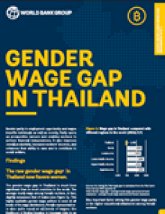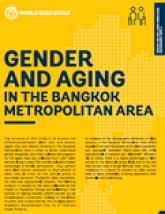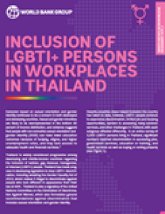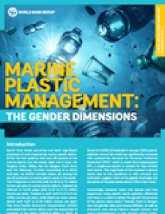Despite progress made towards gender equality in Thailand, persistent gaps continue to impede development and socio-economic growth. The labor force participation rate for women is only 59% compared to 75% for men. Women also continue to spend 3.2 times more time on unpaid domestic and care work than men. Representation of women in national parliament is only 15.7%, which is lower than the average for East Asia and Pacific and upper-middle income countries. The COVID-19 pandemic has set back some of the progress in gender equality as women have been disproportionately affected and have had a slower recovery. The changing socio-economic conditions in the post-COVID era, along with the increased use of digital technology, have further highlighted the challenges faced by women in Thailand.
The Gender and Inclusion Knowledge Management Notes aim to capture and share lessons learned from analytical research and projects that the World Bank has completed to strengthen the data and knowledge on gender in Thailand. Learn more about how gender plays a role in different social and economic settings in Thailand by downloading the notes below:
 | The study finds that the gender wage gap in Thailand is much less significant than in most countries in the world. The average hourly wage among female workers, in fact, slightly surpasses that of males. |
 | Gender and Aging in the Bangkok Metropolitan Area The study assesses the difference between older men and women (aged 60 and above) residing in the Bangkok metropolitan area in order to better understand gender disparities and inform policies and programs for the aged. |
 | Inclusion of LGBTI+ Persons in Workplaces in Thailand Thailand is widely considered progressive among developing and middle-income countries regarding the inclusion of LGBTI+ people. However, despite proactive steps toward inclusion they continue to experience discrimination, limited job and housing opportunities, and other challenges in Thailand. |
 | Marine Plastic Management: The Gender Dimensions The study explores the gender dimensions of four stages of the marine plastic management value chain – production, consumption, solid waste management and marine plastic debris. It draws out key findings from a six-country study including Cambodia, Lao PDR, Myanmar, Philippines, Thailand and Vietnam. |
 | Gender and Informal Work in Thailand The study summarizes how gender impacts those working in the informal sector where in Thailand between 2017 and 2021,informal employment for the 25–54 group held steady at about 65 percent of the total Thai workforce. |
 | Gender and Digital Development in Thailand The study provides an overview of the gender equality issues in digital development in Thailand, drawing on a literature review, initial findings from research conducted in Udon Thani province in 2022, and findings and recommendations from the 2023 Adult Skills Assessment in Thailand. |
